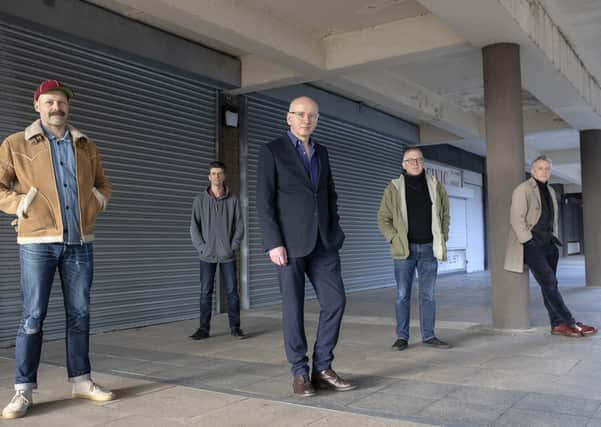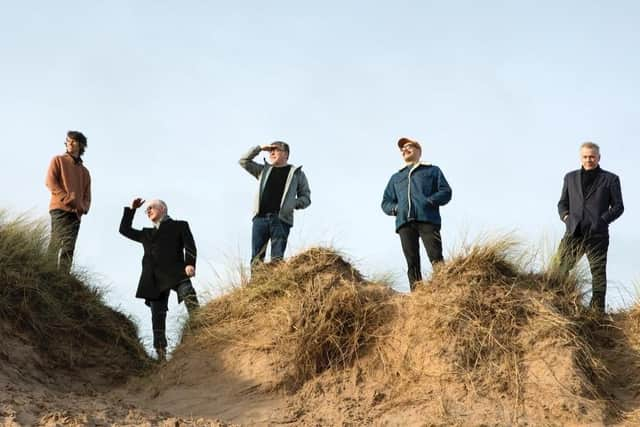Teenage Fanclub: ‘You realise that communication is difficult between people, even close friends’


The 57-year-old singer and guitarist sounds philosophical, pointing out they have had to adapt in the past following with the exits of drummers Brendan O’Hare and Paul Quinn. Love’s departure came after a string of shows in 2018 where Teenage Fanclub revisited the five albums they made for Creation in the 1990s with O’Hare and Quinn. “It was cathartic,” he says. “By the time we came out of the other side of that, as well as having been dwelling a lot on stuff from the past, we were really hungry to do something in the present tense.”
The gigs themselves were “an unusual thing”, he concedes. “I don’t know how many bands there are where you’ve got seven people on stage, including our current drummer (Francis Macdonald) and two previous drummers and a guy who’s just about to leave the band and everybody knows it. But in a way any period of unusualness was maybe within that moment.”
Advertisement
Hide AdAdvertisement
Hide AdBy the time the band’s rejigged line-up of McGinley, Macdonald, Norman Blake, Dave McGowan and Euros Childs stepped into Clouds Hill recording studio in Hamburg they were “excited” to be starting afresh. “We try not to reflect on ourselves as a concept of what we’ve done in the past and what we’re doing now,” McGinley says. “We just look around and here we are in the studio again making a record, and it’s just like it was in 1989 when we were making our first record. I think we always try to put ourselves in that position of not thinking what’s behind us.”
With long-time auxiliary member McGowan replacing Love on bass, Childs, who was previously in Welsh indie band Gorky’s Zygotic Mynci, took over on keyboards. “We toured together with Gorky’s Zygotic Mynci in the 90s, and Norman had done the collaboration with Euros in the band Jonny,” McGinley says. “Euros had also played piano and sung backing vocals on Shadows (Teenage Fanclub’s 2010 album), so he was already part of the family, we’d known each other for a long time. There was no strangeness of ‘oh, there’s somebody new here’.”
That Teenage Fanclub’s playing on their new album sounds freer than it has been in a while has much to do with the fact that they had just come off tour, McGinley believes. “In the past we’ve been guilty of leaving it a bit too long between records and we were spending a bit too long thinking about it before going into the studio,” he says.
“When you go on tour you get into a kind of groove where you feel comfortable of being in a band. It sounds a bit of a daft thing to say, but if you do something every day it becomes second nature, rather than thinking about yourself and what you’re doing.
Advertisement
Hide AdAdvertisement
Hide Ad“When we came off tour in 2018 rather spending time navel-gazing we thought, ‘let’s just go straight into the studio and work on an album in 2019’. We’d go off and play a few shows then go back into the studio again. We hadn’t really done that before. Part of it being freer and more energetic came from enjoying the novelty of having Euros in the band, but also we were closer to having been on stage, just everyday working musicians.”


Hamburg still has a “slight resonance” of Beatles romance about it, McGinley says, adding: “We really like Hamburg, we’ve been going there for quite a long time. It’s a good city, but more than that, we’ve found a good studio where we can work. It’s a place where we feel at home.”
Blake has admitted there is a strong element of autobiography in the six songs he wrote for this record that hint at relationship troubles. For his part, McGinley says: “It’s obvious from the songs that Norman has been going through some stuff in his life whereas my life is not as affected by particular events. I suppose when I write songs I’m just trying to retreat into my subconscious and pull things out that aren’t necessarily things I’m consciously thinking about. I sit down with a guitar and see what comes out.
“It’s not like an exercise or therapy. I think in all good music you’re trying to bring something out of your unconscious mind that you haven’t really thought about. So when you’re sat down singing ‘everything is falling apart’, you’re thinking ‘I don’t know what that means but I’ll try and make some sense of it’. Those things start with an idea that just comes out and you’re trying to reverse engineer around that. Sometimes something comes out of your subconscious that’s more valuable than trying to get smart-a*** about it and project your songwriter-y self onto it.”
Advertisement
Hide AdAdvertisement
Hide AdThemes of home and community run through the record, along with twinges of self-doubt and a sense of loss. “I’ve kind of always been a bit like that,” McGinley says. “You become a bit more comfortable in your own skin referencing those things once you’re in your fifties. I think I’m someone who’s always thought about death and existence but as I’ve got older I’m more accepting of things as they are than questioning how things are. As one insignificant individual there’s not too much you can do about it, and also not to be too narcissistic and think your thoughts are particularly important. It’s an acceptance of those themes of loss or death or the unknown. Maybe I have become more philosophical about whatever it might be.”
Ultimately the dozen songs on Endless Arcade seem like a conversation between old friends McGinley and Blake, who have known each other since the 1980s. “It’s something a few people have said, but we never thought about it,” says McGinley, with a soft laugh. “Sometimes you do things and other people say something about it and you think, ‘well, it is a bit like that’. It’s maybe a bland thing to say, and maybe it comes with age, but you realise that communication is really difficult between people, even between close friends, and sometimes the harder you try to directly communicate with people it can be difficult.
“I think people communicate with each other in all kinds of different ways, and part of writing songs is a different means of expression. Generally I’ve found I’m personally aware that sometimes I find it hard to express myself clearly with other people. Just everyday language and conversation I don’t really like. There is no perfect means of communication between people, but we had no conscious thought of speaking to each other between songs.”
Endless Arcade is out on Friday April 30. Teenage Fanclub play at The Leadmill, Sheffield on April 8, 2022 and Leeds Beckett University on April 9. www.teenagefanclub.com
Comment Guidelines
National World encourages reader discussion on our stories. User feedback, insights and back-and-forth exchanges add a rich layer of context to reporting. Please review our Community Guidelines before commenting.